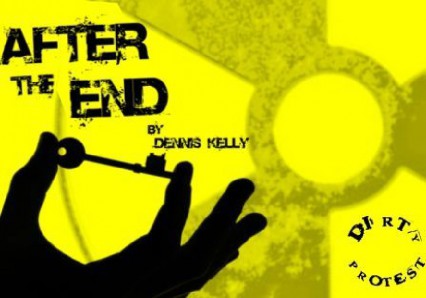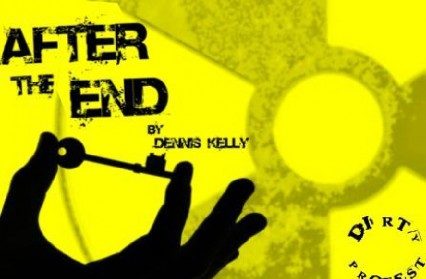Dylan Moore reviews After the End – the latest production from Welsh theatre company, the Dirty Protest collective, at Sherman Cymru.

by Dennis Kelly
Dirty Protest, Sherman Cymru
Cast: Gruffudd Glyn, Kezia Burrows
Dir: Mared Swain.
The first full-length production from Cardiff’s fringe company Dirty Protest is an unqualified triumph. Dennis Kelly’s intense two-hander, the story of Mark (Gruffudd Glyn) and Louise (Kezia Burrows) is a powerful, thought-provoking play. It is a perfect choice for a small company building an impressive reputation; here, it transcends Sherman Cymru’s intimate Theatre 2 space, clever design and huge performances making us feel part of a much bigger experience than the few rows of fold-up chairs would suggest.
We find ourselves in the ‘bunker’ of Mark’s garage, low-level striplights and a stripped back set; during scene changes we are plunged into darkness, accompanied by crackles and buzzes of radio static that occasionally morph into something approximating electrocution. Mark has been stocking up in the event – or, perhaps, the hope – of a nuclear disaster. Louise remembers nothing of the events that have brought her here and wonders why Mark would have gone to such lengths. ‘I kept it stocked,’ says Mark, ‘because the world’s gone fucking insane.’ That might well be the case, but it doesn’t take long for the audience – if not Louise – to work out the subtext here. If the world is insane, it is not quite as mad as Dennis Kelly’s character.
Mark is a truly scary creation, paranoid and unhinged. Louise, understandably, is a nervous wreck. Both actors play the roles brilliantly. Glyn seems to relish Mark’s violent moodswings and increasingly erratic behaviour to show off the full range of his talent; he does vulnerability as well as he does humour or violence. Burrows is a major talent. She walks the tightrope between Louise’s relative normality and her increasing sense of desperation with aplomb, in the process allowing us to buy into what is a fairly improbable storyline.
Together, they create a microcosmic, claustrophobic world in which big themes – sexual politics and ideas about fascism and decadence, power and responsibility – play themselves out in a pressure cooker environment. After the End begins with tension, and for an unrelenting interval-less hour-and-a-half this does nothing but build to an excruciating pitch. The knife-edge tension becomes literal, and the ensuing power struggle involves rape, violence and humiliation.
Kelly’s play is also about the relationship between power and language. ‘You can’t just call somebody a cunt. You don’t really mean it,’ says Louise at one point. On the day that former England football captain John Terry was cleared of any offence having used that word along with a racial epithet, explorations of the contexts within which certain words and phrases are acceptable or not seem particularly pertinent.
There is a degree of release from the intensity ‘after the end’ of the play. We do eventually leave the bunker. But the play’s denouement ensures that, like the characters, we never really escape the scars of an experience that has come to define us. The play is peppered with humour too, dark belly laughs that also tell us something about the human condition and its reaction to adversity. But the prevailing lesson is a sobering one: power belongs to those who are willing to step outside moral and social norms to get it and stop at nothing to retain it.
Dylan Moore has contributed regularly to Wales Arts Review.












